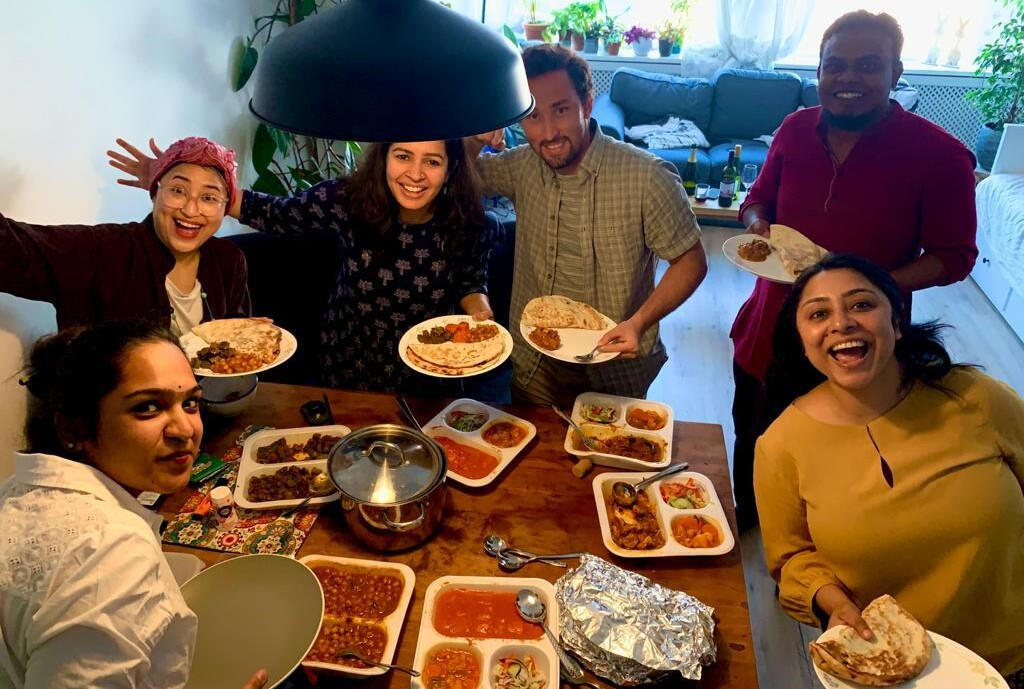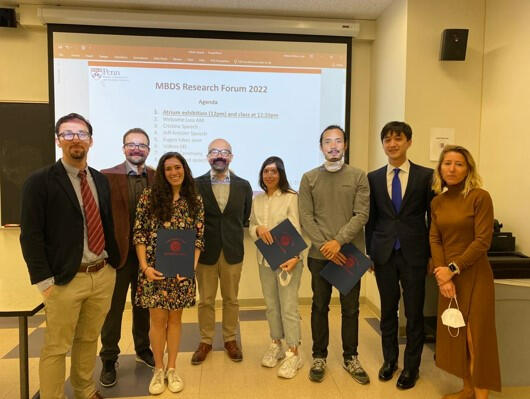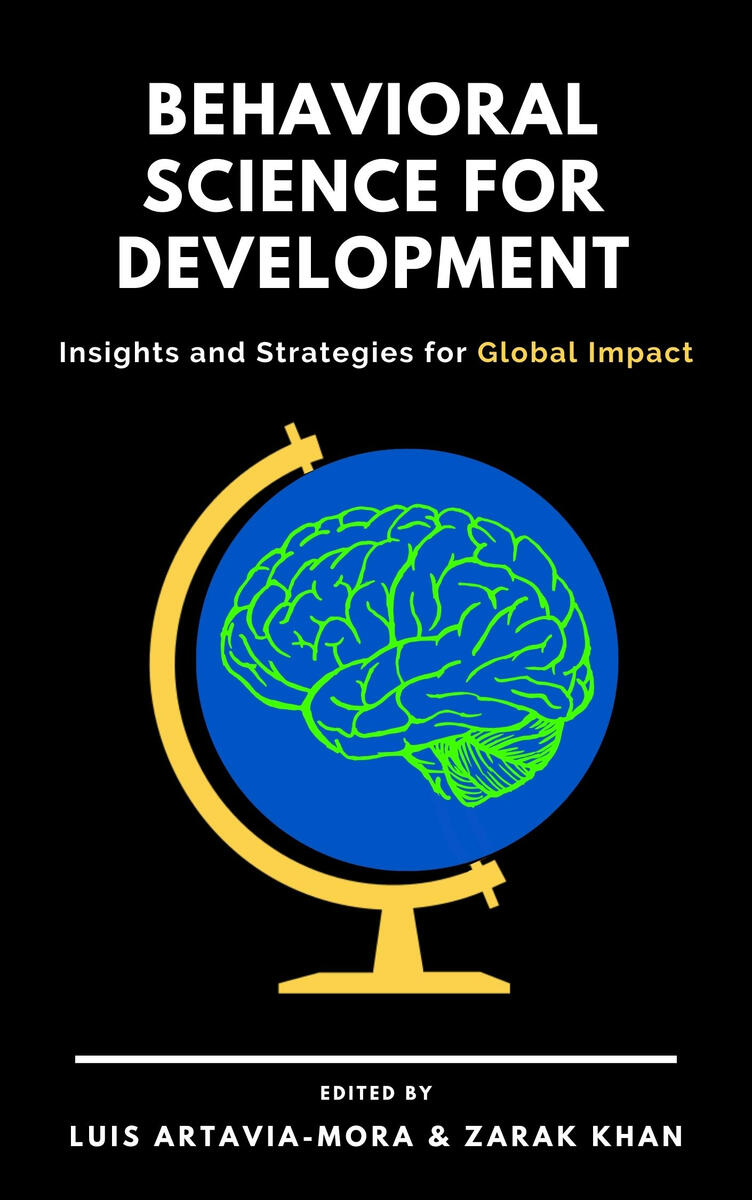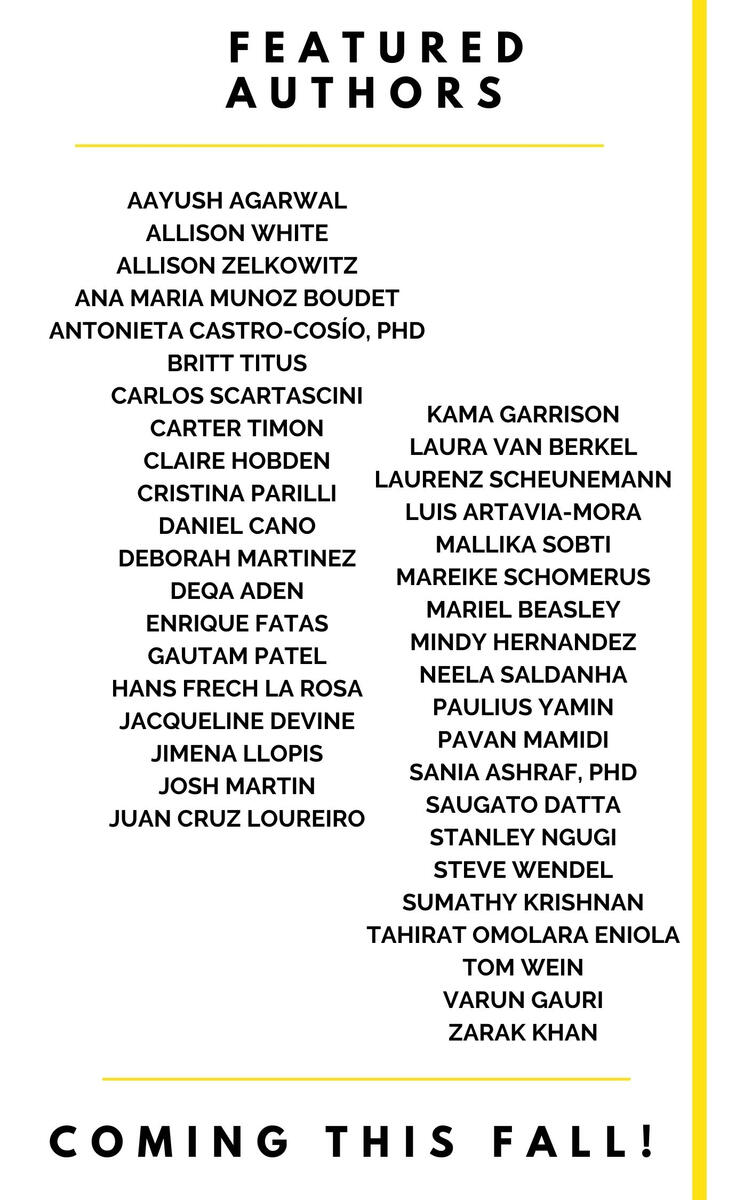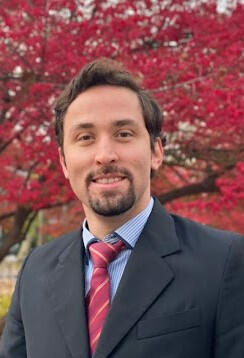
Luis Artavia-Mora
I am an applied development economist with global experience in research, management, and training in system strengthening, behavioral change, and impact evaluation.
Welcome to my website
Thank you for visiting my website!
With 12 years of international experience, I bring a combination of high-level research, management, and training experience in international development generating impact globally. My work strives to create cost-effective strategies that promote better access to opportunities to improve wellbeing worldwide.
By training, I hold a Ph.D. in Development Economics with specializations in behavioral sciences and impact evaluation (e.g., experimental and quasi-experimental designs, A/B testing, and qualitative methods).
I invite you to review my page and to connect with me to drive positive change together.
About me
Having worked globally, I am now working as Research Director at Global Behavioral Strategies.
I have over 12 years of global experience as researcher, manager, and trainer. I am passionate about breaking down barriers and promoting the inclusion of vulnerable groups to create a more just, equitable and healthy society.
Inspired by this mission, my trajectory includes:• Research Director at Global Behavioral Strategies
• Research Consultant at different World Bank units.
• Managing Director at the Master of Behavioral and Decision Sciences at the University of Pennsylvania.
• Research affiliate at the Center for Social Norms and Behavioral Dynamics, UPenn.
• Research fellow at Erasmus University of Rotterdam.
• Research fellow at the Centre for Social and Behaviour Change, Ashoka University.
• Supervisor and mentor of research projects in economic development and behavioral change thesis for PhD and MA students in Erasmus University of Rotterdam and the University of Pennsylvania.
My work
I have led and supported initiatives with a wide range of international organizations, research institutions, governments, and private sector partners.
My portfolio includes work with the World Bank Group, USAID, UNHCR, KIT Royal Tropical Institute, Bopinc, 3ie, The Netherlands Institute for Multiparty Democracy, the Centre for Social and Behaviour Change, The Palladium Group, and others.
These collaborations reflect a commitment to evidence-driven, cross-sector solutions that advance development impact.
Health
I am dedicated to advancing public health by integrating behavior change strategies with health system strengthening and rigorous impact evaluation.
My expertise lies in promoting healthier choices, preventing disease, improving healthcare financing, and enhancing the uptake of scientific evidence. By aligning policy, practice and evidence, I support institutions in achieving lasting improvements in health and wellbeing.
Promoting anti-retroviral therapy in HIV patients (2014-2018)
The project examined a health intervention employing mobile message reminders to bolster medication adherence (to antiretroviral therapy), and retention in healthcare among HIV patients in Burkina Faso. The study evaluated a nationally representative sample of patients in a (two-year) long-term randomized controlled trial to understand whether mobile text and image reminders improve bio-physical and psychosocial outcomes. We tested four treatments and one control group across four rounds of survey (baseline, and 6, 12 and 24 months after).
The intervention used digital technology to address behavioral factors affecting adherence and retention, such as forgetfulness, stigma, and present bias. It examined patients in remote and urban regions, assisted health workers, and collaborated with community associations to underscore the importance of timely and continuous treatment.
Our results showed small impacts on primary outcomes (retention, adherence, and physical health) and strong positive effects on psychosocial measures over the two years. These positive impacts on psychosocial wellbeing show the strongest effects in the first six months and slowly decayed over time.
This project was part of my PhD thesis, funded and developed in collaboration with 3ie International Initiative for Impact Evaluation, Erasmus University of Rotterdam, the University of Bobo-Dioulasso, Université Nazi Boni de Bobo-Dioulasso, Institut du Développement Rural (IDR), and the Ministry of Health in Burkina Faso. I am deeply thankful to my supervisor Prof. Natascha Wagner.
The protocol of the intervention can be found here and more information about the full project here
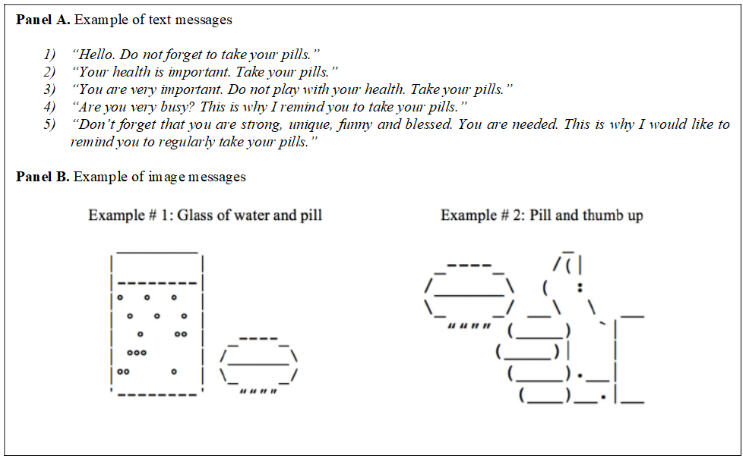
Mental health and mitigating stigma in PLHIV (2014-18)
This project analyzed the impact of HIV stigma on mental health and overall well-being in Burkina Faso. The exclusion and marginalization that HIV-patients suffer due to the stigmatization may impair their subjective wellbeing, and HIV stigma may be exacerbated in low-prevalence and low-income countries where their conceptualization as “outcasts” and the competition for resources intensify. Thus, this project identified the detrimental effects of stigma and put forward potential strategies and support systems to mitigate it, striving to improve their quality of life towards a more inclusive society.
The research investigated HIV-stigma from two angles (employing the four-round panel dataset in the main health intervention, see health project #1):
First, it assessed HIV-stigma as a negative determinant of good subjective health.
Second, it analysed the predictors of HIV-stigma, and patient-level fixed effects models were employed to minimize the influence of confounding factors.
The results showed that “experiencing stigma” has a negative and statistically significant association with good subjective health (2.3%-points, p-value=0.090). Results also indicated that income, household size and sexual activity are positive predictors of good subjective health, while retention in care associates with lower reports of experiencing stigma.
This project was part of my PhD thesis, funded and developed in collaboration with 3ie International Initiative for Impact Evaluation, Erasmus University of Rotterdam, the University of Bobo-Dioulasso, Université Nazi Boni de Bobo-Dioulasso, Institut du Développement Rural (IDR), and the Ministry of Health in Burkina Faso.
I am thankful to my supervisor Prof. Natascha Wagner.
More information can be found here.
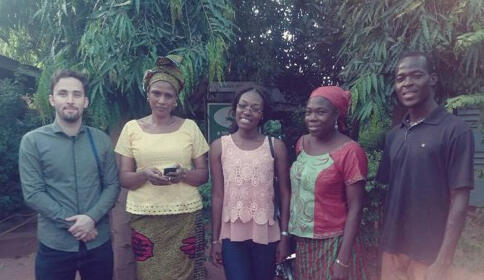
Promoting the use of evaluation findings in health officials (2023)
The project designed, implemented, and evaluated strategies to promote the engagement in and utilization of new evaluation findings (i.e., best practices and lessons learned) for the better evidence-based decision making of policy actors in global health and development (more details on request).
The strategies were designed to build and strengthen communication channels, training sessions, and internal operational systems. They included creating common goals, implementing plans and commitment devices, and testing an email communication intervention.
As a leader of the email-based intervention, my team built an email-based intervention tailored to reach two high-level groups of policy actors. By adding links to products with the emails, the intervention examined the effectiveness of three type of text emails integrating social and behavioral insights to improve outcomes: (i) a control message including only a basic personalization feature such as addressing the recipients by their names, (ii) a professional identity message aiming to reinforce the professional mission and duty of the actors, and (iii) a loss aversion message framing the loss of missed opportunities associated with not engaging with the evaluation findings.
The effectiveness of the three communications was examined using two key metrics: (i) email open rates and, (ii) click-through rates on the links directing to the products.
Moreover, the research evaluated three-rounds of data collection with different number of reports in each wave. This design allowed us to measure engagement levels across email conditions that vary by type of message (control, professional identity, and loss framing) and the number of reports shared (1, 2, and 5).
The results showed promising evidence of utilizing behavioral insights within email communication to boost the engagement with evaluation findings for the two populations under study.
The loss framing technique and the the professional identity email message generated the highest engagement results in population #1 and population #2, respectively (as measured by click-through rates). In both cases, the impact of the behavioral techniques are large and stable across the three rounds of the intervention, and it is independent of the number of reports shared. Consistent with the literature, the evidence reflects that sharing a single product caused the best engagement rates overall. The results also showed varying impacts between men and women.
This project is developed for The Palladium Group in collaboration with high-level partners in the international development sector. More information on request.
The full report can can be found here.
Restructuring the health system in Kazakhstan (2013-14)
This project was part of a multidisciplinary effort to strengthen Kazakhstan's healthcare system to ensure its long-term resilience. My responsibilities focused on supporting the modernization and restructuring of hospital facilities and services based on the projections of future medical demands (up to 2050).
My tasks involved supporting the lead consultant in the design of a projection analysis and strategic roadmap for hospital reconfiguration of general and specialized rooms based on demographic health trends, and in recommending ways to optimize resource allocation, purchasing newer health technologies, and streamlining administrative processes.
This project was developed for an international consulting company and local partners.
More information upon request.
Forecasting the need of health professionals in India (2013-14)
The objective of this project was to strengthen India’s healthcare system to ensure its long-term resilience. My responsibilities focused on forecasting hospital needs based on international benchmark standards and on the projection of local health demands for the coming decades.
My tasks involved supporting the lead consultant in forecasting the expected number of general practitioners and medical specialists in Tamil Nadu up to 2050. The project also compared these projections with WHO international benchmark standards to ensure compliance with high quality of care.
This project was developed for an international consulting company and local partners.
More information on request.
Social and economic inclusion
My work advances socioeconomic inclusion by identifying and scaling strategies that improve access to essential markets and services for vulnerable populations.
I combine behavior change approaches, systems thinking, and impact evaluation to address structural barriers, inform policy, and foster more equitable and inclusive development outcomes in cost-effective ways.
Gender-based violence in politics (2025)
My work examines strategies to promote the access of vulnerable groups to essential markets and services.
Overcoming discrimination in the housing market (2018-20)
The objective of the project was to facilitate the integration of ethnic minorities into the European housing market. This work was important because residential location shapes the quality of education, health, employment, and safety an individual gets; however, research shows historically high and systematic rates of discrimination against ethnic minorities in European markets, including The Netherlands.
My work tested two behavioural tools to mitigate housing discrimination against Turkish and Moroccan descendants in Amsterdam. The study examined whether seeking housing through a secondary and less prominent platform decreased discrimination rates, and whether a positive reference letter from a Dutch landowner (with a native, majority-group name) improved access to housing.
The results showed that using an auxiliary website created for, and designed by, minority groups lessened discrimination, and that attaching a reference letter from a previous landlord did not influence access to housing.
The project concluded that creating and using a specifically tailored platform empowers vulnerable groups by providing a supportive network that promotes inclusivity and social cohesion.
This project was part of my PhD thesis developed for Erasmus University of Rotterdam (here)
Example of reference letter in study
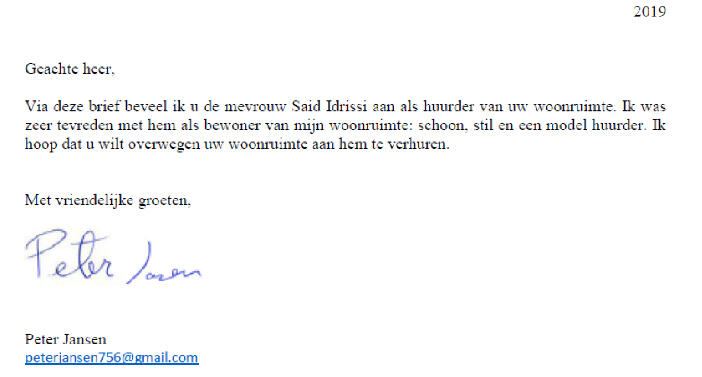
Translation of letterDear Sir,
Through this letter I recommend Mrs. Said Idrissi as a tenant of your living space. I was very satisfied with him as a resident of my living space: clean, quiet and a model tenant. I hope you want to consider renting out your living space to him.With best regards,
Peter Jansen
Financial inclusion in Peru (2023)
This work focused on identifying the key underlying behavioral drivers and causes of discrimination towards Venezuelans and women in the financial system of Peru, aiming to advance strategies to promote their inclusion and to improve the organization’s client-base indicators (more details on request).
The project crafted a diagnostic tool to examine both conscious and unconscious biases within financial managers, risk analysts, executives, and other staff members towards these vulnerable groups. The tool sought to pinpoint causal cognitive, social, and physical barriers that may hindering the access of these minorities to financial services. Strategic recommendations were put forward based on the results of the diagnostic tool.
Furthermore, an intensive 3-day training workshop was delivered to the participants from the local financial institution. The workshops increased awareness and fostered empathy and institutional capabilities in their activities and employee base.
This project was developed for the Social Sustainability and Inclusion team from the World Bank, in collaboration with the International Finance Corporation and other local partners. Deeply thankful to World Bank leader Paula Rossiasco, Lorena Levano and Greta Granados; and my consulting team Prof. Enrique Fatas and Dr. Paulius Yamin.
Publications:
* Blog in Spanish
* Blog in EnglishPhoto of training for trainers:
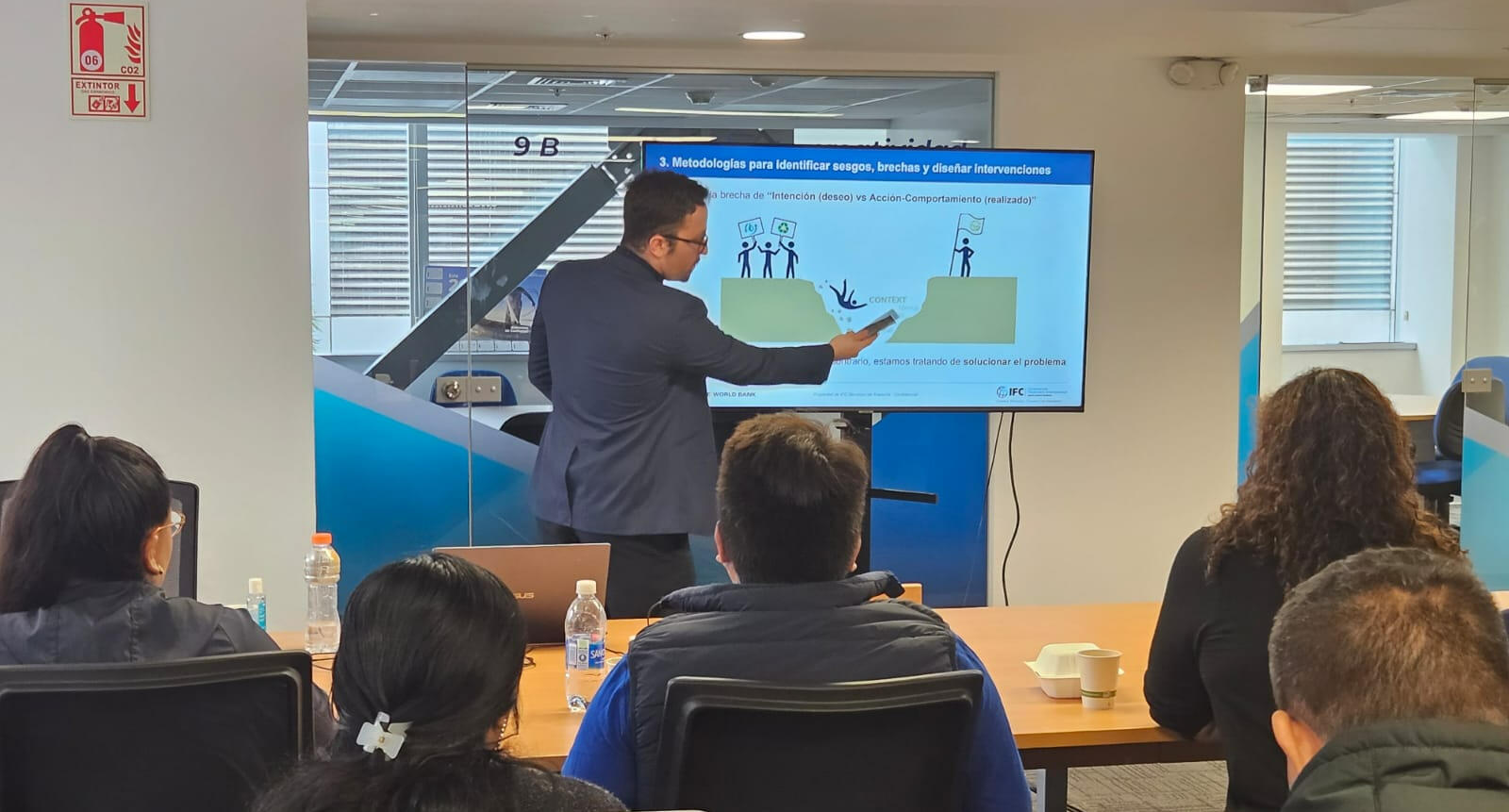
Helping and punishing behavior (2015-17)
This project explored insights to improve helping and punishing behavior within modern societies.
By building a natural field experiment in The Netherlands, the study sought to shed light on the underlying cognitive mechanisms driving human cooperation and punishment when interacting with strangers, such as social norms and evolutionary traits.
The findings indicate that subjects are intuitively predisposed to help strangers and become more selfishly as they have more time to think about the potential costs and benefits of helping.
Conversely, deliberation lowers the probability to engage in punishing behavior as the fears of retaliation increase.
This project was part of my PhD thesis developed for Erasmus University of Rotterdam.
Published here
Social inclusion of migrants in Latin America (2023 - ongoing)
Several projects are in progress to evaluate the impact of two edutainment initiatives aimed at fostering the social and economic inclusion of Venezuelans and women across Latin America.
These studies aim to understand the effectiveness of using a host of educational and entertainment interventions to mitigate xenophobia, exclusion, and prejudice towards vulnerable groups, by changing perceptions, attitudes, social norms, and behaviors in host societies.
By assessing the cost-effectiveness of edutainment initiatives, these impact evaluations will provide an evidence-based basis for future programs.
These projects are developed for the the World Bank and regional partners in South America.
Publications: Products will be generated as results are estimated.
Youth employment in Costa Rica (2023 - ongoing)
This project promotes the equitable access of young professionals into the competitive labor market of Costa Rica.
Recognizing the multiple challenges faced by the youth, this initiative provides technical advice to a local NGO connecting private companies and recently graduated university students to increase work experience, internships, and future job placement.
By recommending the use of leading social and behavioral insights, the project advances the scope of the NGO’s service and tactical approaches to enhance the retention of students and commercial partners into the program, as well as streamlining its business operations.
This advice will ameliorate the program by putting forward goal-oriented targets, emphasizing social norms among stakeholders, improving communication strategies, and creating more empathy and attractiveness to its mission and relevance for the economy.
Recommendations are developed for a local NGO in Costa Rica.
More information upon request.
Digital financial inclusion in India (2023 - ongoing)
A behavioral study is undertaken to ease the access and utilization of digital financial technologies among women and other vulnerable populations in India.
The investigation examines local intricacies and underlying mechanisms influencing the behavior of men and women in the use of digital technologies (i.e., trust, aspiration, expectations, social norms, etc.). The study will uncover culturally nuanced insights to discover challenges and opportunities.
Our purpose is to put forward more effective policy instruments to guide researchers, policymakers, and stakeholders, fostering inclusion and empowerment in such technologies.
This project is developed in collaboration with the Centre for Social and Behaviour Change, Ashoka University (India).
More information on request.
Other work
Other projects include:
Financial accessibility in rural Costa Rica (2011)
In the heart of rural Costa Rica, a financial accessibility study examined the drivers underlying the contrasting realities of two neighboring communities. One community, notably wealthier, stood juxtaposed with the other, facing significant economic disparities.
The primary goal was to identify underlying attitudes and barriers impeding access to financial services and economic development between these communities.
The results found underlying factors such as lower motivations, aspirations, financial literacy, and poor access to credit to develop infrastructure projects and entrepreneurial initiatives.
This project was developed for the Instituto de Políticas para la Sostenibilidad.
Microbiology lab market research in Costa Rica (2013)
This project developed a study within the microbiology laboratory market in Costa Rica.
This in-depth analysis sought to unravel the intricate web of laboratory chains, products, services, and associated costs, thereby providing a holistic view of the industry dynamics within the local market.
By comparing these dimensions, this market study shed light on the competitive landscape, identifying key players, laboratory studies and reactive offers, market trends, and opportunities for growth.
This resource served as a valuable resource for entrepreneurs and investors looking to navigate the market in Costa Rica, fostering a more informed and efficient evidence-base for decision making.
This project was developed for an international consulting company in Costa Rica.
More information upon request.
Benchmark of development indexes (2015)
A comprehensive benchmark study was undertaken to compare the multifaceted social and economic indices, rankings, and outcomes across a spectrum of high, middle, and low-income countries.
The research investigated an array of critical indicators related to income, health, education, corruption, business creation and development, poverty, wellbeing and quality of life, among other interesting outcomes.
The results of the study highlighted striking disparities and commonalities across countries of similar and different income levels and unveiled factors steering societal well-being and economic progress.
This project was developed for a consulting research team in The Netherlands and South Africa.
More information upon request.
Supervision of students' thesis (2015-23)
As a university professor and research mentor, I have had the privilege of guiding a diverse portfolio of graduate-level projects at the University of Pennsylvania and Erasmus University Rotterdam.
These projects have explored innovative strategies to enhance outcomes across private sector development, market research and consumer behavior, and international development.
Green Behaviors
The everyday actions individuals and organizations take to reduce environmental impact. Our team helps clients understand, measure, and promote eco-friendly practices across sectors. Whether you are designing a public campaign, evaluating the effectiveness of a sustainability program, or seeking to shift consumer habits toward greener choices, our evidence-based insights will help you drive meaningful, measurable change. Let us support your journey toward a more sustainable future.
Reusable Behaviors
In progress
Recycling Behaviors
In progress
Scaling up Reuse Businesses for BoP
In progress
Real estate development
In progress
Presentations & Press
I have shared results of my work in academic and policy events worldwide, including India, Italy, The Netherlands, England, United States, Peru, and Costa Rica.
Such events include: Het Dag van het Gedrag, International Meeting on Experimental and Behavioral Social Sciences, the Indian Behavioral Science Dialogue, the Tinbergen Institute, regional consultations, and technical meetings.
My work has also been featured in media outlets, including an article for a major Italian NGO- Agenda for International Development. You can find it here
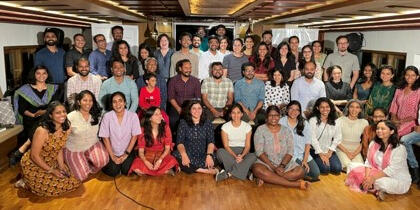
Publications
1. Artavia-Mora, L. and Khan, Z. (2023). Behavioral Science for Development: Insights and Strategies for Global Impact. Action Design Network Publisher. ISBN:1736652532, (Hard copy & Kindle versions.)
2. Yamin, P, Artavia-Mora, L, Martunaite, B and S. Lahiri. 2023. Installations for Civic
Culture: Behavioral Policy Interventions to Promote Social Sustainability. Sustainability,
15(4), p.3825 (Review)
3. Artavia-Mora, L. (2020). Understanding and Overcoming Biases Against Marginalized
Groups: Behavioral and Experimental Evidence From the Netherlands and Burkina Faso.[Doctoral Thesis, Erasmus University Rotterdam]. Erasmus Universiteit Rotterdam
(EUR). ISBN 978-90-6490-123-2 (Review)
4. Demena, B.A., Artavia-Mora, L., Ouedraogo, D., Thiombiano, B. A., & Wagner, N. (2020). A Systematic Review of Mobile Phone Interventions (SMS/IVR/calls) to improve
Adherence and Retention to Antiretroviral Treatment in Low and Middle-Income
Countries. AIDS Patient Care and STDS. 34(2), 59-71 (Review)
5. Artavia-Mora, L., Wagner, N., Thiombiano, B.A., & Bedi, A. (2020). Adaptation and
Biomedical Transition of People Living with HIV to Antiretroviral Treatment in Burkina
Faso. Global Public Health, 15(5), 638-653. (Review)
6. Artavia-Mora, L., Bedi, A.S., Rieger, M. (2017). Intuitive Help and Punishment in the
Field. European Economic Review, 92, 133-145. (Review)
7. Wagner, N., Ouedraogo, D., Artavia-Mora, L., Bedi, A., & Thiombiano, B.A. (2016).
Protocol for a randomized controlled trial evaluating mobile short message services
(SMS) to promote retention and adherence to anti-retroviral therapy for people living with human immunodeficiency virus (HIV) in Burkina Faso. Journal of Medical Internet Research: Research Protocols, 5(3): e170. (Review)
8. Wagner N, et al. (working paper). Durability of mobile message reminders to improve
retention, adherence, andpsychosocial wellbeing in PLHIV: A 2-year large-scale study in Burkina Faso. Unpublished manuscript. (Review)
9. Artavia-Mora L. (working paper). Averting housing discrimination? Evidence from
Craigslist and reference letters in Amsterdam. Unpublished manuscript. (Review)
10. Artavia-Mora L, et al. (working paper). Stigma as social determinant of health in a large scale and panel data sample of PLHIV in Burkina Faso. Unpublished manuscript. (Review)
Services
Implementing the lessons of social and behavioral science empowers you and your business to craft more effective strategies to achieve objectives, attain greater efficiency, innovation, and success.
In my work I utilize the power and principles of behavioral sciences to improve outcomes for individuals and organizations in a wide range of activities. To generate effective strategies, I translate academic and industry-level evidence into solutions that will be practical and achievable in your context. I care about creating impact in
peoples' lives and their businesses.
I specialize in using quantitative and experimental methods to research and design actionable recommendations tailored to the target audience and business objectives. This approach can improve wellbeing, productivity, profits, and optimize processes for greater impact in operations and processes.
My primary services are:
Explore my services!
Should you have an interest in my work, please reach out today for further details on how we can collaborate to help you achieve results, both in scope and visibility.
I invite you to reach me on my contact page.
Understanding and measuring obstacles
My work helps you to identify, measure and overcome subtle and complex factors that are having major negative impacts in your life and business.
This research can diagnose conscious and unconscious drivers influencing the decisions behind your baseline outcomes, offering creative and practical actions to improve results.
Besides a variety of mixed research methods, my distinctive value proposition centers on the application and evaluation of causal-based analyses. This method is essential
to uncover the factors governing human actions, having the objective to pinpoint
with precision the true barriers and most effective solutions to overcome them.
I am eager to chat with you to gain a deeper understanding of your case and objectives!
You can reach me on my contact page.
Seeking and recommending solutions
My consultation guides you on the selection and implementation of strategies that are cost-effective to mitigate and overcome the underlying factors limiting your results.
The recommendations are designed to make you achieve results in faster and cheaper ways, by sharing precise and easy to implement actions to change behaviors and operational barriers. To find these strategies and recommendations, I tailor the latest academic and industry evidence to your situation.
I look forward to helping you identify and implement strategies to achieve your objectives!
You can reach me on my contact page.
Testing and tailoring solutions
My methodology employs an array of cutting-edge techniques to find the most cost-effective solutions to your needs. Using a variety of research methods allows me to find, test and tailor the best strategy (or a set of actions) that will help you achieve your objectives in a faster and more efficient way at a cheaper cost.
During the testing phase I typically apply methods such as A/B tests, randomized controlled trials (RCTs), quasi-experimental designs, short interviews, and/or focus group discussions. The data is often collected using online platforms and/or
in-person meetings.
In case you are interested to learn more about how to test and tailored solutions,
please reach me on my contact page.
Sharing solutions through trainings
In my training courses I share the theoretical and applied underpinnings of the field, learning the best practices and lessons to leverage behavioral insights yourself.
I have taught immersive courses that demonstrate the real-world application of behavioral sciences in a variety of sectors. Participants can gain access to leading tools, enabling them to understand the principles to drive results themselves.
My two primary courses include:
1- Theory and applications on behavioral and experimental methods (1-day workshop)
This course presents theoretical foundations of behavioral and experimental methods, and it shares practical tools to design and evaluate strategies in STATA software.
The workshop prioritizes three objectives:
1. understanding theoretical foundations,
2. sharing applications, and,
3. testing strategies using descriptive and econometric tools.
2- Behavioral Science in development (3-day workshop)
We must first understand how people and groups behave to build more cost-effective strategies that alleviate poverty and improve well-being globally.
To this end, this course discusses theoretical, empirical, and methodological foundations of behavioral science, keeping a central view on their implications for real-life development policy.
The course reviews examples on human cooperation, ethnic discrimination, health, gender, politics, education, and environmental sustainability to build your knowledge in the area, and provides tools to critique and formulate cutting-edge applications.
The workshop prioritizes three objectives:
1. understanding behavioral foundations for economic development,
2. measuring and testing behavior in development, and,
3. implications for development policy.
You can reach me on my contact page.
Behavioral Science for Development: Insights and Strategies for Global Impact
Co-edited with Zarak Khan, this book is the result of the collaborative effort of may behavioral science leaders in international development. I am deeply thankful to each of them for their support in this journey.
In 23 chapters this book shares a combination of invaluable insights, strategies, and wisdom aimed to empower practitioners.
Whether you are new to the field or an experienced professional, you will find value in its perspectives and rich content. You can order the hard copy and Kindle versions in Amazon.
I invite you to review more details below!
My contribution,
In the book I delve into three pivotal chapters that address pressing technical questions and societal challenges:
• In chapter #3, Steve Wendel, Zarak Khan, and I explore the rich menu of behavioral and process frameworks, offering readers a deep mapping of the theoretical underpinnings and applied steps on how to influence human behavior.
• In chapter #10, Carter Timon, Zarak Khan, and I present the variety of actors and stakeholders in the international development community. We introduce the type of organizations and teams having behavioral science units or experts applying insights worldwide.
• In chapter #21, Professor Enrique Fatas and I focus on seeking ways to prevent the exclusion of minority groups. We offer practical and cost-efficient strategies aimed at overcoming discrimination, prejudice, and exclusion to foster inclusivity, equality, and social justice in our world.
Book blurps,
“A fascinating journey through the heart of behavioral science for development, where evidence meets impact.”
~ Dr. Chiara Varazzani, Director at the OECD
“Development practitioners often forget that behind the changes needed to advance as a society, there are human beings. And that their behaviors largely condition the outcomes of any development efforts. As the coordinator of the World Bank’s team responding to the Venezuelan massive human exodus, our job is helping Latin American societies to adapt to change, transforming short term challenges into development opportunities. This book is an invaluable resource for us, as it offers the tools, frameworks and experiences that we need to offer the societies we serve comprehensive solutions that drive behavioral change in addition to policy reform and programmatic responses, ensuring lasting and sustainable improvements in the lives of people.”
~ Paula A. Rossiasco, Senior Social Development Specialist, Social Sustainability and Inclusion Global Practice. The World Bank
"In 'Behavioral Science for Development' practitioners, policymakers, and researchers will find a bridge between groundbreaking research on behavioral science and practical solutions. This handbook is an essential guide to discovering and learning from behavioral change initiatives that are enhancing lives around the world."
~ Lorena Lévano Gavidia, Social Sustainability and Inclusion. Latin America and The Caribbean. The World Bank
Contact
I look forward to getting to know you and sharing ideas together.
Please reach out on my LinkedIn or contact me through this form!
